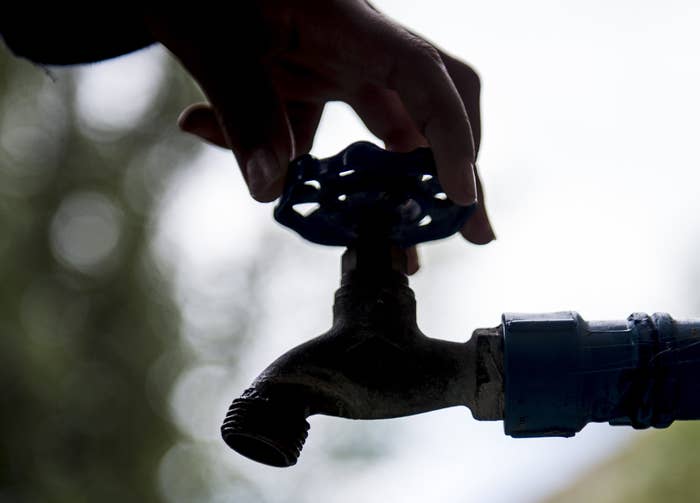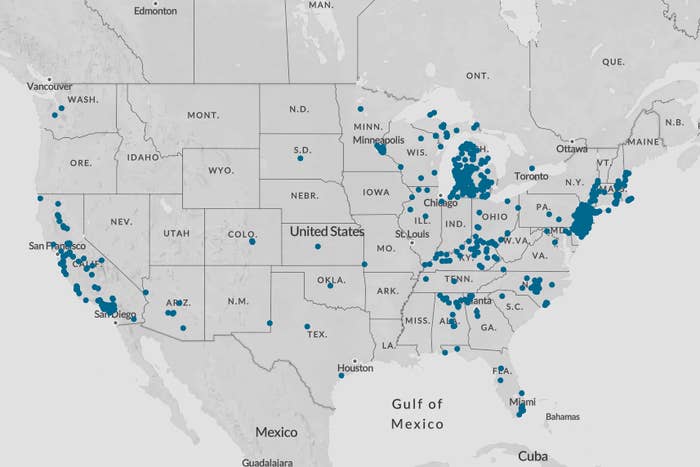Drinking water was contaminated in 43 US cities, a new study found.
Reporting From Washington, D.C. Posted on January 22, 2020

Martin Bernetti / Getty Images
Dozens of cities nationwide — including Miami, Philadelphia, and New Orleans — have toxic “forever chemicals” in their drinking water, an environmental group reported on Wednesday.
Such long-lived "fluorinated" PFAS chemicals (short for per- and polyfluoroalkyl substances) have emerged in the last decade as a wider pollution concern because of some evidence of links to cancer and lowered fertility. They are perhaps best known from the 2019 movie Dark Waters, about pollution from a DuPont facility in West Virginia.
Earlier surveys have linked water contamination with these chemicals to firefighting foams and Teflon, but the new independent lab results, which detected PFAS chemicals in 43 of 44 cities tested last year, point to a more widespread problem.

EWG / Via ewg.org
A map of PFAS in drinking water from 2018.
“PFAS in drinking water is not okay,” Environmental Working Group study co-author Sydney Evans told BuzzFeed News. Evans said the group was surprised to see the chemicals turn up in cities as varied as Miami, New Orleans, and Philadelphia. The only place they tested that didn't have PFAS contamination was Meridian, Mississippi, which gets its water from a 600-foot-deep well.
Earlier surveys conducted by the Environmental Protection Agency and the EWG had not shown such a widespread presence of the chemicals in drinking water, Evans said. Her team tested for 30 PFAS chemicals, including some widely used in making stain-resistant clothing, rather than only the two most common ones.
EPA has suggested a 70 parts-per-trillion (ppt) limit on those two chemicals. Some states have set stricter limits in response to more recent health studies, with New Jersey setting the strictest of 13-14 ppt. The new report’s drinking water samples held concentrations higher than those lower limits in more than a dozen places. The highest levels of contamination were found in North Carolina and Iowa.
“To date, EPA has developed methods to reliably detect 29 PFAS chemicals in drinking water,” an agency spokesperson told BuzzFeed News by email. “Aggressively addressing PFAS will continue to be an EPA priority in 2020 and we will provide additional information on our upcoming actions as it becomes available.” The agency delayed setting more limits on PFAS chemicals last year, announcing instead a commitment to start testing large cities for contamination.
Independent experts say the findings are preliminary, but concerning. Earlier EPA tests ending in 2015 looked at only six PFAS chemicals, for example, and missed contamination in Wilmington, North Carolina. “This EWG study is certainly not comprehensive but gives some insight” into how much contamination has been missed by past tests, said North Carolina State University environmental engineer Nadine Kotlarz.
The environmental group is calling for a more thorough nationwide look at the compounds in drinking water, and increased efforts to filter them by utilities.
“PFAS levels may not actually have changed, but we are now able to measure the levels,” drinking water scientist Martin Shafer of the University of Wisconsin told BuzzFeed News. He called for caution before panicking over the new numbers, pointing out that tests of the health risks, if any, of the newer PFAS chemicals will need to be done first. “One really needs to compare apples to apples here.”

Paul Morigi / Getty Images
PFAS chemicals are perhaps best known from the 2019 movie Dark Waters with Mark Ruffalo, about pollution from a DuPont facility in West Virginia.
MORE ON THIS
EPA Delays Decision To Set Drinking Water Limits On Toxic “PFAS” Chemicals

Martin Bernetti / Getty Images
Dozens of cities nationwide — including Miami, Philadelphia, and New Orleans — have toxic “forever chemicals” in their drinking water, an environmental group reported on Wednesday.
Such long-lived "fluorinated" PFAS chemicals (short for per- and polyfluoroalkyl substances) have emerged in the last decade as a wider pollution concern because of some evidence of links to cancer and lowered fertility. They are perhaps best known from the 2019 movie Dark Waters, about pollution from a DuPont facility in West Virginia.
Earlier surveys have linked water contamination with these chemicals to firefighting foams and Teflon, but the new independent lab results, which detected PFAS chemicals in 43 of 44 cities tested last year, point to a more widespread problem.

EWG / Via ewg.org
A map of PFAS in drinking water from 2018.
“PFAS in drinking water is not okay,” Environmental Working Group study co-author Sydney Evans told BuzzFeed News. Evans said the group was surprised to see the chemicals turn up in cities as varied as Miami, New Orleans, and Philadelphia. The only place they tested that didn't have PFAS contamination was Meridian, Mississippi, which gets its water from a 600-foot-deep well.
Earlier surveys conducted by the Environmental Protection Agency and the EWG had not shown such a widespread presence of the chemicals in drinking water, Evans said. Her team tested for 30 PFAS chemicals, including some widely used in making stain-resistant clothing, rather than only the two most common ones.
EPA has suggested a 70 parts-per-trillion (ppt) limit on those two chemicals. Some states have set stricter limits in response to more recent health studies, with New Jersey setting the strictest of 13-14 ppt. The new report’s drinking water samples held concentrations higher than those lower limits in more than a dozen places. The highest levels of contamination were found in North Carolina and Iowa.
“To date, EPA has developed methods to reliably detect 29 PFAS chemicals in drinking water,” an agency spokesperson told BuzzFeed News by email. “Aggressively addressing PFAS will continue to be an EPA priority in 2020 and we will provide additional information on our upcoming actions as it becomes available.” The agency delayed setting more limits on PFAS chemicals last year, announcing instead a commitment to start testing large cities for contamination.
Independent experts say the findings are preliminary, but concerning. Earlier EPA tests ending in 2015 looked at only six PFAS chemicals, for example, and missed contamination in Wilmington, North Carolina. “This EWG study is certainly not comprehensive but gives some insight” into how much contamination has been missed by past tests, said North Carolina State University environmental engineer Nadine Kotlarz.
The environmental group is calling for a more thorough nationwide look at the compounds in drinking water, and increased efforts to filter them by utilities.
“PFAS levels may not actually have changed, but we are now able to measure the levels,” drinking water scientist Martin Shafer of the University of Wisconsin told BuzzFeed News. He called for caution before panicking over the new numbers, pointing out that tests of the health risks, if any, of the newer PFAS chemicals will need to be done first. “One really needs to compare apples to apples here.”
Paul Morigi / Getty Images
PFAS chemicals are perhaps best known from the 2019 movie Dark Waters with Mark Ruffalo, about pollution from a DuPont facility in West Virginia.
EPA Delays Decision To Set Drinking Water Limits On Toxic “PFAS” Chemicals
Nidhi Subbaraman · Feb. 14, 2019
Nidhi Subbaraman · July 2, 2019
Dan Vergano · May 20, 2016
Dan Vergano is a science reporter for BuzzFeed News and is based in Washington, DC.
Contact Dan Vergano at dan.vergano@buzzfeed.com.
Dan Vergano is a science reporter for BuzzFeed News and is based in Washington, DC.
Contact Dan Vergano at dan.vergano@buzzfeed.com.
No comments:
Post a Comment